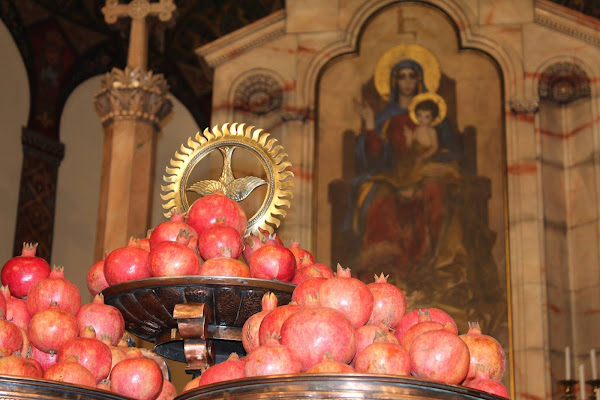The Armenian New Years Blessing of Pomegranates
 |
In 2015, His Holiness Karekin II, Catholicos of All Armenians, blessed pomegranates in the Mother See of Holy Etchmiadzin for the first time and established it as an annual tradition on New Year's Eve (or day).
The Pomegranate is considered by many faith traditions to be the fruit of the tree of knowledge and a symbol of abundance and life.
The custom of blessing fruits was known among the Israelites. The Jews offered to the Temple the first harvest, which included wheat, barley, grapes, figs, pomegranates, olives and honey.
In nations of the East, the pomegranate is considered to be the king of all fruits, not only because of its pleasing taste and medicinal properties, but also because the top of the pomegranate resembles a crown. Some believe that the design of ancient royal crowns was based on the pomegranate "crown".
The pomegranate has been known in the East from the 12th to the 7th centuries BC. Because Cartagena was known for its pomegranates, the ancient Romans called the pomegranate malum punicum 'Cartagena (Phoenician) apple' and malum granatum 'granular apple'.
As a national symbol, the pomegranate has been widely used in Armenian architecture, carpet weaving, arts and crafts and manuscripts illuminated by Gregory Khlatetsi, Toros Taronatsi, Toros Roslin, and in the Haghpat and other Gospels.
In Christianity the pomegranate symbolizes the diversity of God's grace, the Church. Just as the seeds of the pomegranate are separated by thin membranes yet held tightly together, in the same way the Christian Church holds all Christians around the world together in Christ's love; though they are separate, they are not divided. Thus the pomegranate shows unity in diversity.
The pomegranate's crown represents Jesus' crown and His sovereignty over the entire world. The red color symbolizes His salvific Blood that was shed for all. The popular belief is that each one contains 365 seeds corresponding to the number of days in a year, symbolizing new life in Christ and the New Year.
H/T: The Armenian Kitchen



Comments
Post a Comment